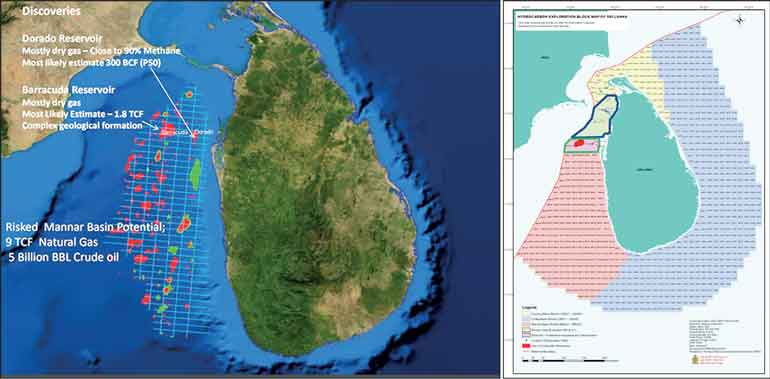Thursday Feb 26, 2026
Thursday Feb 26, 2026
Saturday, 30 July 2022 00:00 - - {{hitsCtrl.values.hits}}

The long delayed Mannar Basin M2 block (exploration and production) tender and the commencement of exploration work by the selected bidder for the M1 and C1 July 2019 tender could cost Sri Lanka over a billion dollars in foreign direct investment. Moreover, delays conducting a marketing campaign to attract further investment while oil and gas prices have been at historically high levels could be foregoing billions more.
Cairn India drilled three completed exploratory wells between 2011 and 2013. Two of the wells, Barracuda and Dorado contain gas estimated to be 1.8TCF and 300 BCF respectively. While they were not commercially viable when oil and gas prices collapsed in 2014, there is a strong possibility they will be at today’s prices. There are technologies that have reduced capital expenditure such as gas-to-wire power generation that help make the economic case for production of these gas finds.
Cairn India has invested nearly $ 200 million in Sri Lanka, but it would require an investment of over $ 1 billion to build production infrastructure. Therefore, it is vital to urgently attract as many investors as possible for exploration and production to maximise benefits to Sri Lanka – especially in light of the global energy crisis and the concomitant energy price increases which has enhanced investor appetite.
While one must drill to ascertain the actual existence and quantity of resources, Seismic studies estimate 9 TCF of gas and several billion barrels of oil in the Mannar Basin.
This could fulfil several decades of the country’s energy needs while potentially saving $ 6-7 billion p.a. in expenditure on energy. It also opens opportunities for Sri Lanka to earn revenue through Production Sharing Agreements with investors who take 100% of the risk.
The industry, which holds the potential to contribute crucial foreign exchange, both in terms of investment and possible future revenue from production, has largely been ignored or mismanaged in recent times. It is imperative that Sri Lanka does not miss the small window of opportunity available with high prices and supply pressures, fast disappearing internal combustion engines, as well as the displacement of fossil fuels with the advent of “Net Zero”.